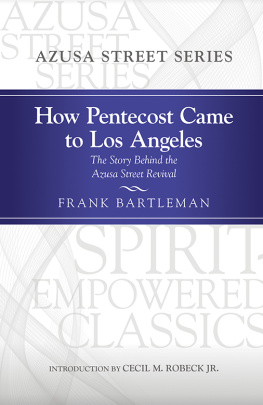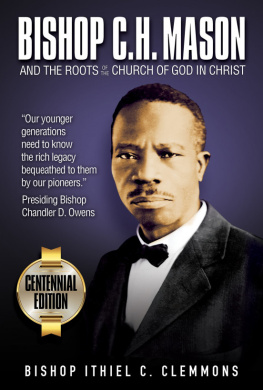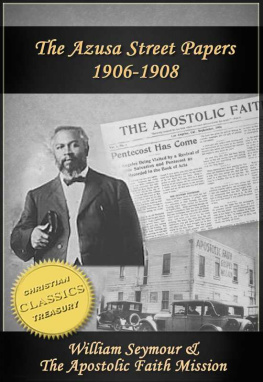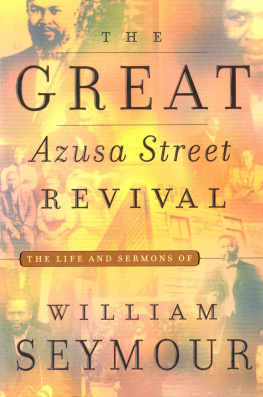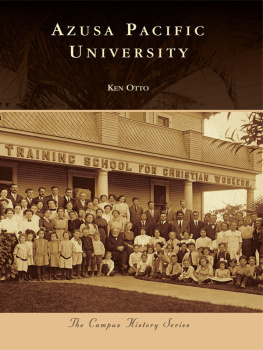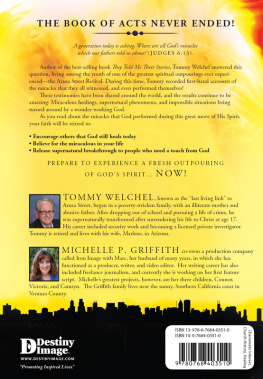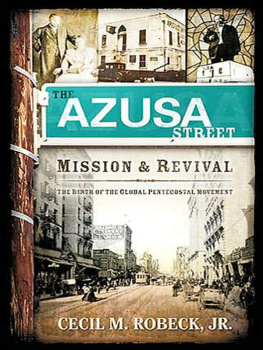ENCOUNTERING TRADITIONS
Rumee Ahmed, Randi Rashkover, and Jonathan Tran, Editors
AZUSA REIMAGINED
A Radical Vision of Religious and Democratic Belonging
KERI DAY
STANFORD UNIVERSITY PRESS
Stanford, California
STANFORD UNIVERSITY PRESS
Stanford, California
2022 by the Board of Trustees of the Leland Stanford Junior University.
All rights reserved.
No part of this book may be reproduced or transmitted in any form or by any means, electronic or mechanical, including photocopying and recording, or in any information storage or retrieval system without the prior written permission of Stanford University Press.
Printed in the United States of America on acid-free, archival-quality paper
Library of Congress Cataloging-in-Publication Data
Names: Day, Keri, author.
Title: Azusa reimagined : a radical vision of religious and democratic belonging / Keri Day.
Other titles: Encountering traditions.
Description: Stanford, California : Stanford University Press, 2022. | Series: Encountering traditions | Includes bibliographical references and index.
Identifiers: LCCN 2021037168 (print) | LCCN 2021037169 (ebook) | ISBN 9781503615236 (cloth) | ISBN 9781503631625 (paperback) | ISBN 9781503631632 (ebook)
Subjects: LCSH: Apostolic Faith Mission (Los Angeles, Calif.)History. | African AmericansCaliforniaLos AngelesReligion. | RevivalsCaliforniaLos AngelesHistory20th century. | PentecostalismUnited StatesHistory20th century. | RacismReligious aspectsChristianity. | CapitalismReligious aspectsChristianity. | DemocracyReligious aspectsChristianity.
Classification: LCC BX6194.A7 D 39 2022 (print) | LCC BX6194.A7 (ebook) | DDC 289.9/30979494dc23
LC record available at https://lccn.loc.gov/2021037168
LC ebook record available at https://lccn.loc.gov/2021037169
Cover image: Fire flame, Nejron Photo | shutterstock
Cover design: Rob Ehle
Typeset by Kevin Barrett Kane in 10/14 Minion Pro
TO
Ariella Rose
TABLE OF CONTENTS
ACKNOWLEDGMENTS
It is always hard for me to write the acknowledgements section because I am always afraid someone will be left out.
This book project began stirring inside of me while I was a visiting professor at Yale University Divinity School in 2016. While having dinner with a good friend, Marlon Millner, the conversation about scholarship on Pentecostalism began. There would be countless conversations over the next year that Marlon and I would have that helped me see why I needed to write about the Azusa Revival from my unique vantage point as a black feminist-womanist scholar. I am indebted to Marlon for generously offering his time, encouragement, energy, and knowledge on scholarship in Pentecostal studies. Without these early conversations, I would not have begun writing this book. Thanks so much, Marlon.
As I began research for this book, I realized that I needed to be in conversation with a top scholar in Pentecostal studies, particularly on the Azusa Revival. And so I turned to Dr. David Daniels. I would not have been able to write this book without becoming a student of David. We have had many conversations over the last few years about this book in a number of places, including accidently bumping into each other at a couple of conferences and taking time to do lunch in order to talk about my unfolding project. David would send me essays and articles to clarify questions and arguments I was thinking through. It has been pure joy to learn from David, and much of my historical research is indebted to his generous guidance.
Although I was not in direct contact with her, I want to acknowledge the extensive scholarly work of Dr. Estrella Alexander. Her various books were of tremendous help as I wrote about the women of Azusa. I do believe her labor of love in clarifying the role of women at Azusa and in black Pentecostalism will serve as an invitation for other black women to write about these movements in new and fresh ways.
A final person who was instrumental as I wrote this book was Dr. J. Cameron Carter. This book was written over five years, and I lectured on most of the chapters in many universities, divinity schools, and seminaries. One important conversation I had with Jay was in his home as he and his wife graciously hosted me as the Pauli Murray / Nannie-Helen Burroughs Lecturer at Duke Divinity School in 2018. My conversation with him helped me clarify what I meant when I referred to Azusa as a lawless community. Our rich sharing together was invaluable. Thanks, Jay, for your friendship and conversation in this area.
Where would I be without my students? Specifically, my course The Idea of Pentecost was instrumental as I thought about the ideas I present in this book. Students of different theological and ideological viewpoints in this course pushed me, debated with me, and affirmed why this was a worthy project. I cant name all thirty-one students but know that I deeply appreciate each of you.
I am grateful that my home institution, Princeton Theological Seminary, gave me a sabbatical so that I could finish this manuscript. Waking up to write most days was a sweet joy.
My editor is the bestUli Guthrie, you have become my friend and my writing coach. Thanks so much.
I want to thank my mother and father, Connie Woods and Wilbur Day, and their respective spouses for their continued support. I am also grateful for my close friends: Tamura Lomax, Cece Jones-Davis, and Shively Smith, women who always hold me down.
To my husband, Austin Moore, who is my best friend and biggest cheerleader, youre the best. You give me good love. And finally, the newest member of my family, my sweet baby daughter, Ariella Rose, whom this book is dedicated to. You are the best of who I am and will ever be. May this book allow you to see your Pentecostal heritage anew so that you may be able to work toward justice, care, and belonging.
Introduction
SUBVERSIVE BEGINNINGS
I AM A CHILD OF PENTECOSTALISM. My spiritual world did not begin with sophisticated theological vocabularies or coherently formulated propositions about God. I was not familiar with refined systems of theological speech that neatly explain elusive spiritual realities. I was not taught to think of faith only as an exercise of the intellect. My childhood Pentecostal community was adamant that spiritual experiences should not be reduced to this kind of rational grammar.
My small childhood churcha tiny gray brick building filled with blue-clothed pewswas wary of words alone being able to capture religious experiences and spiritual truths. We depended on divine encounters that were unpredictable, even unimagined. These divine encounters were gorgeously messy, always involving our bodies, tears, shouts, dances, screams, trembles, and ecstasy. We were children of providential dis-order, disordering all expectations and rules around religious worship and divine encounter. My small Pentecostal community lived inside a liminal space between divine revelation and divine mystery.
There is beauty and ugliness in any community, and my childhood church was no different. We were filled with contradictions. While we imagined ourselves as premillennial adherents, withdrawing from the political order of the world in order to wait on the return of Christ to correct all of the worlds wrongs, we nevertheless used politically informed speech about the world and felt that our speech mattered to ongoing social problems. While we allowed women to teach and preach freely in our worship services, with full recognition that they were essential to the flourishing of the church, my church also kept women off the pulpit and did not support women at top-tier levels of ministry such as ordained ministry. While our forms of worship and ways of experiencing the divine were highly democratic, breaking many rules of liturgical order, our community nevertheless upheld very moralistic positions that ignored and dismissed peoples agency to live authentic and honest lives. Concerns about social transformation tacitly occupied our minds, although we often imagined ourselves embodying the opposite of this-world concerns.


